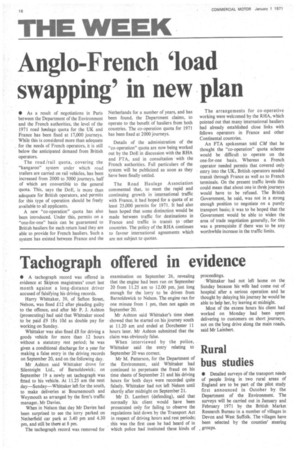Tachograph offered in evidence
Page 18

If you've noticed an error in this article please click here to report it so we can fix it.
• A tachograph record was offered in evidence at Skipton magistrates' court last month against a long-distance driver accused of falsifying his driving records.
Harry Whittaker, 39, of Sefton Street, Nelson, was fined £12 after pleading guilty to the offence, and after Mr P. J. Ashton (prosecuting) had said that Whittaker stood to be paid £9 18s 10d as double pay for working on Sunday.
Whittaker was also fined £8 for driving a goods vehicle for more than 12 hours without a statutory rest period; he was given a conditional discharge for a year for making a false entry in the driving records on September 20, and on the following day.
Mr Ashton said Whittaker drove for Silentnight Ltd., of Barnoldswick; on September 19 a newly set tachograph was fitted to his vehicle. At 11.25 am the next day—Sunday--Whittaker left for the south, to make deliveries at Bournemouth and Weymouth as arranged by the firm's traffic manager, Mr Davies.
When in Nelson that day Mr Davies had been surprised to see the lorry parked on Netherfield car park at 3.40 pm and 4.30 pm, and still be there at 8 pm.
The tachograph record was removed for examination on September 26, revealing that the engine had been run on September 20 from 11.25 am to 12.00 pm, just long enough for the lorry to be driven from Barnoldswick to Nelson. The engine ran for one minute from 1 pm, then not again on September 20.
Mr Ashton said Whittaker's time sheet showed that he started on his journey south at 11.20 am and ended at Dorchester 11 hours later. Mr Ashton submitted that the claim was obviously false.
When interviewed by the police, Whittaker said the entry relating to September 20 was correct.
Mr M. Patterson, for the Department of the Environment, said Whittaker had continued to perpetuate the fraud on his time sheets of September 21 and his driving hours for both days were recorded quite falsely. Whittaker had not left Nelson until shortly after midnight on September 21.
Mr D. Lambert (defending), said that normally his client would have been prosecuted only for failing to observe the regulations laid down by the Transport Act in respect of driving hours and rest periods; this was the first case he had heard of in which police had instituted these kinds of proceedings.
Whittaker had not left home on the Sunday because his wife had come out of hospital after a serious operation and he thought by delaying his journey he would be able to help her, by leaving at midnight.
Most of the excess hours his client had worked on Monday had been spent delivering to customers on short journeys, not on the long drive along the main roads, said Mr Lainbert.




















































































